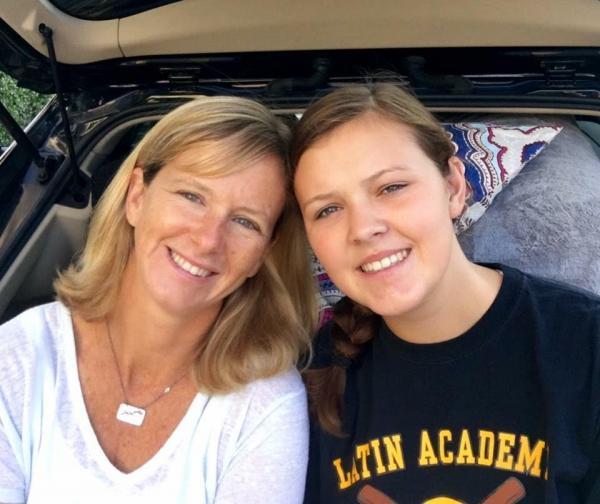April 13, 2017

Erin Murphy and her daughter Margaret Whalen will both serve as delegates to a state party convention for the first time this summer. “I felt it was time to get officially involved,” said Murphy.
Participation in Massachusetts Democratic Party affairs has amped up since November, party officials say, bringing uncharacteristically high numbers to ward meetings and spurring an influx of new delegates.
With groups including immigrants, Muslims, LGBTQ individuals, women and people of color expressing increasing nervousness about the Trump administration’s priorities, Democratic observers say they have seen a corresponding bump in local political involvement.
“As a state rep, I’ve noticed a large uptick in people reaching out on federal issues and wondering how they can work on state issues,” said Dorchester legislator Dan Hunt. “That’s encouraging to see, because we want to connect with people, and I’ve noticed a large amount of people engaging in the process that never have before.”
Hunt said a recent meeting of Ward 16 included at least 15 to 20 individuals who had never before attended a caucus. In selecting delegates for the state convention on June 3, Ward 16 elected six women and four men who have never been to a convention, Hunt said. Including alternates, 15 out of the 27 delegates for the ward are new to the process and new to conventions.
One of those delegates is 46-year-old Erin Murphy, a Neponset resident who has participated in local politics from the outside but lately has found herself both frustrated and newly invigorated by recent events.
“I’ve always been active and engaged,” she told the Reporter, “but never in the actual political process. After 2016 election, which I felt was so troubling and disappointing to so many women, I felt it was time to get officially involved.”
She and her daughter, Margaret Whalen, 19, campaigned in New Hampshire for Hillary Clinton. She recalled their staying up until 2 a.m. together, “feeling the initial shock as I watched the map. Just the shock at first, just as you figured out what happened.”
A long-time teacher at the Richard J. Murphy School that bears her grandfather’s name and now at the Henderson Inclusion School, Murphy said the consequences of losing federal funding strike her personally. “The free lunch programs could be cut,” she said, “and on immigration, there are so many students in class who are undocumented and are worried now. And the environment. There are a lot of issues that you realize we will be hurt by, even though we voted against him.”
Whalen, a freshman at Bridgewater State University who voted for the first time last year, joined her mother at the ward meeting and ended up as a youth delegate. She is also politically engaged, in deep disagreement with Trump on several administration positions.
“I feel so strongly about women’s right to choose, and it’s frightening to think about,” she said. “I always grew up with the women in my family saying how lucky I am and how easily that could be taken away from me. So this was taking fear and frustration and turning that into something positive, rather than just complaining.”
Speakers at a well-attended meeting of the state Democratic platform committee on April 6 at the Boston Teachers Union Hall at Columbia Point, the second in eleven such events planned through May, presented an agenda that called for increased emphasis on criminal justice reform, a bolstering of public education, action on climate change, and civil protections for immigrants and people of color.
“Economic justice has to be what the Democrats stand for,” urged former Boston City Councillor Charles Yancey, emphasizing the need to protect affordable housing units from privatization. “We should be fighting for contract compliance on all public and private contracts, and to work with our brothers and sisters in the unions to increase representation of women, and people of color in leadership of our unions,” he said.
A contingent of those who spoke highlighted the “Raise Up” bills asking for a $15 an hour minimum wage, paid family medical leave, and the fair share amendment, which would add a 4 percent tax on annual income above $1 million. The state of these issues are seen as increasingly dire under the Trump regime, attendees said. And the strong turnout at party events has reflected that sentiment.
Ann Clarke, the executive director of the Massachusetts Teachers Association, said that Nov. 8 – “a very bad night for all of us in a lot of respects” – came with a bright side on the local front as the charter-cap expanding Question 2 was defeated by a 62 to 38 percent margin. She asked for increased and targeted support for public schools in the platform, “a very important document, something that you put together every four years and it sets the guideposts for moving forward. And I think this platform is a particularly significant one.”
Clarke, a member of the Ward 19 committee, which represents precincts in Jamaica Plain and Roslindale, said, “What we saw in January at the ward committee meeting was a lot of new people coming into the ward committee, so I think there is just a huge amount of interest right now in the party.”
Massachusetts Democratic Party chair Gus Bickford said after the meeting that the party as a whole has seen “significant energy and participation.” The numbers for turnout at party gatherings this year are “at least double, maybe more,” he said. And there is a difference in attitude now compared to late December and early January, he added.
“There was fear and no hope,” he said. I’m not saying the glass is half full now, but with the no vote on the Affordable Care Act [repeal], there is a recognition that this type of energy and participation is making a difference.”
Topics:



